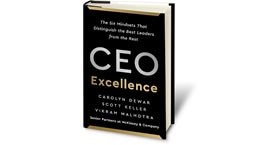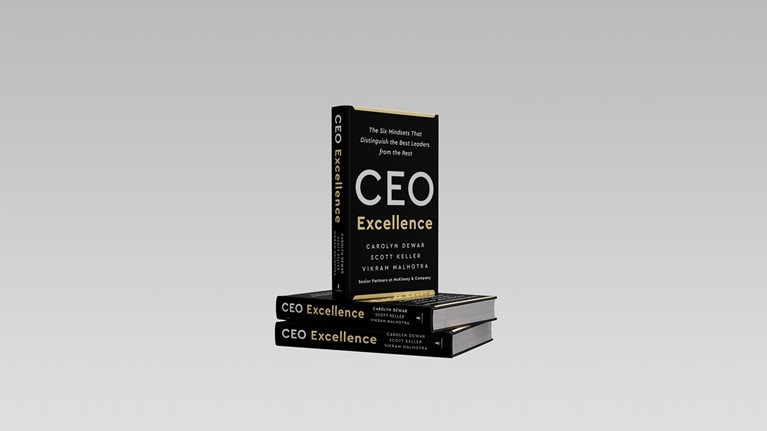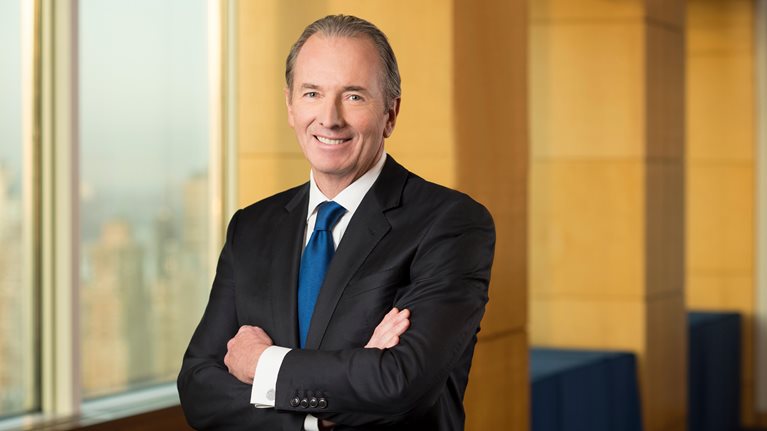Stephen Schwarzman cofounded the Blackstone Group in 1985 and grew it into one of the largest investment firms in the world, with nearly $1 trillion in assets under management and businesses in private equity, real estate, and credit, among other areas. In this episode of the Inside the Strategy Room podcast, Schwarzman talks with Vik Malhotra, former chairman of McKinsey’s Americas region, and senior partner David Schoeman about his approach to leadership and talent and how he assesses investment opportunities. This is an edited transcript of the discussion. For more conversations on the strategy issues that matter, follow the series on your preferred podcast platform.
Vikram Malhotra: You founded the Blackstone Group more than 35 years ago. What were you looking to build and how has that evolved over time?
Stephen Schwarzman: Founding a business is more than being a CEO. When you start something, you need a compelling reason for people to deal with you—something innovative that creates the momentum for successful execution. My partner Pete Peterson and I spent three months meeting for two to three hours every day over breakfast developing the strategy. We decided that one part had to be the M&A business. It’s what we knew, and it required no capital. Also, I had been doing advisory work for the relatively few people who were in the private equity business in the early 1980s. I was working at Lehman Brothers and tried to get them into that business, but I was turned down for reasons of perceived conflict with our clients. I knew private equity would be huge and we had the relationships in place, so that became the second piece. The third part of the strategy was that we would retain ultimate control, so if something went wrong, we wouldn’t have to compromise to protect customers.
Those were the three elements of our strategy. We announced it to the world, and the world didn’t much care. It was very hard to raise the private equity fund when we had never been investors, which shows you how delusional we probably were, but we convinced the world to give us the biggest first-time fund in history up to that time. When Larry Fink was looking to leave First Boston, we funded his and his partner’s venture. That business, BlackRock, ended up becoming the largest money manager in the world by assets.
We also went into hedge funds with Julian Robertson, who went on to become the best hedge fund manager over a 20-year period. During the real-estate recession in 1991 and 1992, many savings and loans went broke and their assets were seized by the government. Somebody asked us to help them buy some of those assets. We didn’t know anything about real estate; I didn’t even know how to price it. We did it on a ratio familiar to me, which was six times cash flow less capital expenditures, and we ended up generating a 64 percent compound rate of return. If you do that once, you want to do it twice, so we asked John Schreiber to help us do that. John and I, in effect, were the general partners.
What did it take to build each of those businesses? A giant market down on its luck that we knew would come back and an amazing natural leader and builder. We have now done that in a whole series of businesses. But there are no patents in finance, and as I watched almost every new product we launched become very successful, there was nothing to stop an infinite amount of money from crowding into the space, which causes margins to collapse. So I believed that we had to be continually innovative. I don’t know whether this was due to inspiration or just abject fear that whatever we were doing might melt away. Now, we have almost a trillion dollars in assets and 60 different strategies.
What did it take to build each of our businesses? A giant market down on its luck that we knew would come back and an amazing natural leader and builder.
Vikram Malhotra: You started with a set of audacious principles, but what gave you the courage to make those bold moves into real estate or credit at a time when they were troubled?
Stephen Schwarzman: If I had thought they were bold, I wouldn’t have done them! I viewed them as businesses in which you couldn’t lose. I went to an office opening with the mayor of Miami one day, and he asked me, “Why did you decide to take such a big risk on Miami?” I said, “I didn’t think it was a risk. I don’t like risk.” And it turned out not to be risk. I didn’t view those moves as bold or audacious. I viewed them as completely logical, and I could explain why at the time. What I never figured out was why most of our competitors didn’t care. Part of being successful is imagining what will happen before it happens. It’s much harder to have a great dream that you know will work than executing it, because if you only select the ideas that you’re sure will be dramatically successful, putting the pieces in place is like paint by numbers. The real art is coming up with something that will be profound.
Vikram Malhotra: How do you think about resource allocation, whether it’s capital or talent? It requires trade-offs and is often a zero-sum game.
Stephen Schwarzman: In our business, capital doesn’t matter. The question is where to place your talent and management attention. You learn over time that if you ask B-level talent to do an A-level job, they will fail every time. We’re not creating semiconductors here; it’s just finance. That means you can only rely on your A players, and nobody has that many. The opportunity needs to be very compelling for an A player to give up what they are doing. That makes decisions easier: if you can’t get that A-level talent, you shouldn’t pursue the opportunity. Particularly if you’re going into geographic locations or business in which you have no experience, you need somebody who is a grand master or mistress of that domain. The compensation doesn’t much matter if they accomplish the mission, because if you stick to missions that are truly consequential, it will work economically no matter what you pay that person.
The question is where to place your talent and management attention. If you ask B-level talent to do an A-level job, they will fail every time. That means you can only rely on your A players, and nobody has that many. The opportunity needs to be very compelling for an A player to give up what they’re doing.
David Schoeman: In your book, What It Takes: Lessons in the Pursuit of Excellence, you talk about the need to hire “tens”—those A-level players. As Blackstone went from one strategy to 60, how did you ensure that you continued to get tens?
Stephen Schwarzman: It became easier. It’s hard to hire at the beginning because everybody sees you as a risk and they want such a huge part of the business in return that it doesn’t make economic sense to start it. As the business gets bigger, you attract people much more easily. We could barely hire anybody of quality when we started.
Vikram Malhotra: From the outside in, it looks like even in the world of the Great Resignation, you have done a remarkable job not just of recruiting but retaining strong talent. What’s the secret sauce?
Stephen Schwarzman: I think it’s creating excitement. Everybody here is always learning. What’s new? What’s interesting? Where should we be? What should we avoid? In that sense, there is no stability—in a good way. We’re in a business that’s based on instability. If you happen to be an American and you think you have figured out how our country and markets work, there are so many other markets to learn. To be good, you have to be accumulating information continually and you have to find that stimulating. You are signing up for an adventure and you will be around people who are similar but nice. We don’t hire individuals with sharp elbows. One of the principles we had when we started was: no internal politics. We don’t believe in that. It’s corrosive and takes away from building teams and trust. Everybody here is a player–coach. It’s very difficult to replicate that kind of culture.
Vikram Malhotra: How have you shaped this culture over time?
Stephen Schwarzman: The mistakes you make help you figure out what the culture should be. I’ve made a number of mistakes and I always analyze them. It’s fascinating how human beings try to distance themselves from their mistakes as if they weren’t present when they happened, let alone in charge. The first thing I always do when something doesn’t go the way I had expected is ask, what did I miss? You learn those lessons and you say, “OK, we can’t ever do this again.” That’s part of culture. You eliminate process mistakes, human mistakes like lack of coordination. Then you overlay your core values about what’s right and wrong, and you have to articulate them. When I spoke to 800 new employees, I told them, “Here is what we think and here is why we think this. You can vote for whom you want, you can read whatever you want, but on core values, everybody signs up.”
Vikram Malhotra: So what are some of your core values?
Stephen Schwarzman: Excellence in all we do. Openness. Horizontal management. We’re all the same; the only difference is some of us have a little more data because we’re older. We don’t believe in glass ceilings. Part of our value system is to be expanding because it’s good economically and it provides promotion opportunities. But you have to be collaborative. You have to communicate. If somebody from another group calls you, you quickly call them back. They are calling you because they need you. You have the right to make such calls as well—you don’t have to figure everything out for yourself; all questions are fair. It’s like a fast break in basketball: if someone throws the ball to you and you don’t look over and catch it, it’s a turnover.
Subscribe to the Inside the Strategy Room podcast
Vikram Malhotra: How does your culture balance two of the rules in your book, one of which is to be bold and the other to not lose money?
Stephen Schwarzman: That’s totally consistent. “Bold” just means that something is big and ambitious, but I also believe anything we do should be almost instantly profitable. Finance moves so quickly that if you can’t be profitable in the first year or so, the reason you started the initiative may be gone.
Vikram Malhotra: Sandy Ogg [former operating partner in Blackstone’s private equity group] told me that one of the notions you introduced or that you jointly developed was “talent to value,” recognizing that in any organization there are 50, 100, or 200 roles that disproportionately drive value. Can you explain how you think about talent in key roles?
Stephen Schwarzman: It’s no different than a sports team. What does it take to make a great football team? It takes a great general manager, a great coach, and a great quarterback. If you have people in those positions who are tens, the others don’t much matter. You pay anything you can to your franchise quarterback, and the coach improves good players who the general manager is smart enough to hire. Each of those three leaders has to have a gift, and if they do, the rest of the team will show up and you will win championships. What is your point of influence? It’s almost always a person in charge.
David Schoeman: In your book, you talk about the transition to a professional organization and the role Tony [Hamilton James, former Blackstone president and COO and recently retired executive vice chairman] played. You have a great line that says, “Tony and I will agree on everything except when to be bold.” How do you think about the different skill sets for your team?
Stephen Schwarzman: You have to have synchronicity with everybody but not the same skills. Tony likes structure. He is a trained manager, unlike me, and he knew he needed to have a 360-degree review. He put in a lot of systems that I wouldn’t have known about. When you’re assembling a team, you want people who share the core values but have different strengths. Tony and I think the same way about investments and strategies on deals; that is the core of any investment business, but we have different approaches and roles.

CEO Excellence
Vikram Malhotra: What would you say are the four or five traits that are core to your success?
Stephen Schwarzman: One is a desperation to be successful. Second is enormous energy. Third, I think while I sleep, which is unusual and a real competitive weapon. And the fourth is being able to recognize paradigm shifts before almost anyone. When everything is going fine, I’m not as curious about that, and I can tell things are fine by people’s tones of voice—they are in the usual range. But as soon as something happens that’s outside the norm, I’m awake.
For example, if one piece of information is inconsistent with a big analysis, people tend to dismiss it because everything else points in a certain direction. The way my mind works, I’m only interested in that one piece of data or information that’s inconsistent because it’s the key to something changing. Sometimes I can figure it out just based on that one piece. It’s like that old TV show Name That Tune. They give you one note—can you name the song? Then two notes, then three notes. I have a simple rule that I have a one-third chance of figuring out the change with one piece of information, a two-thirds probability with two pieces, and with three pieces of information, 100 percent. That’s been very useful to me.
If one piece of information is inconsistent with a big analysis, people tend to dismiss it because everything else points in a certain direction. I’m only interested in that one piece that’s inconsistent, because it’s the key to something changing.
Vikram Malhotra: How would you describe your leadership model?
Stephen Schwarzman: It depends on the issue. If I think there will be trouble, I’m on it. In troublesome public-relations issues, I will micromanage. But the president of the firm, Jon Gray, can handle almost anything, so I don’t need to get involved. I have no difficulty delegating, but I like to know what’s going on. My job isn’t to interfere but to observe the people who are executing, and sometimes to lighten things up, so at big meetings I will say something to get a reaction, to have people relax.
I have also learned not be the first person speaking. You always learn more letting others speak than hearing yourself think. If you’ve seen and lived something numerous times that other people haven’t, letting them screw up is a bad idea. You become an active watcher, and if it starts going wrong, you say, “Why don’t we think about it this way?” The key is letting everyone become self-actualized.
David Schoeman: How do you relax?
Stephen Schwarzman: I used to play tennis. I also love being on a boat, looking at the water and the sun while I’m reading. You see birds flying overhead and it’s absolutely lovely.
Vikram Malhotra: You have numerous external commitments and philanthropic ventures. How do you think about those relative to your leadership responsibilities?
Stephen Schwarzman: As you get older, you are asked to do more things. I get involved in initiatives that have a big impact on the community or the world, and I like to participate in paradigm-changing activities. But my time is scarce, and if somebody of high quality is running an organization, they don’t need me watching over them.
For example, MIT [Massachusetts Institute of Technology] is trying to make the United States more competitive in technology, particularly in computer science. My perception was that we were falling behind in that arena, with insufficient financial support and government involvement. How do I change that? I happened to know the head of MIT and talked to him about this. He said, “This is a profound problem. I’d love to double my computer science faculty and deploy it not just in conventional engineering and computer science but link it to all the other areas so we could become the first AI-enabled university.” I said, “If you did that, wouldn’t your competitors do the same thing?” He said, “Of course. That’s the point. We could scale it by waking up other great universities.” I didn’t look at it as philanthropy—I was trying to solve a problem.
I do these types of initiatives in different fields, but what they all have in common is that we are changing something and there is no existing organization addressing that issue. I don’t regard that as different than what I do at work. It just happens to be not-for-profit.


